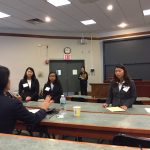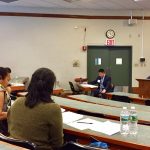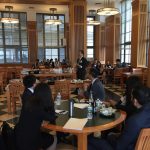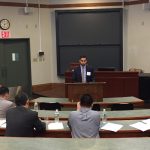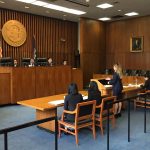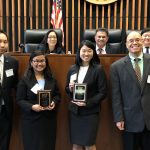On October 14, the Northeast Regional of the 2017 Hon. Thomas Tang National Moot Court Competition, sponsored annually by the NAPABA Law Foundation, took place at Brooklyn Law School, where nine teams from the northeast region, representing American University Law School, Brooklyn Law School, Fordham, Northeastern, and St. John’s, faced off in an appellate advocacy competition. In addition to Brooklyn Law School, its APALSA, and NAPABA, the competition was also hosted by AABANY, with special thanks to Francis Chin and Samuel Yee for coordinating the event.
Founded in 1993, the competition honors the late Honorable Thomas Tang who served on the United States Court of Appeals for the Ninth Circuit from 1977 until 1995. Judge Tang is known for his leadership in the Asian Pacific American legal community as well as his fervent support of NAPABA, shown in part by the creation of this moot court competition. Moreover, his record as a judge demonstrates an uncompromising commitment to civil rights for all.
The stated purpose of the competition is to develop advocacy skills without regard to the merit of the parties’ cases. This year’s case—Eiko Endo, et. al., Petitioners v. State of Apalsa, Respondent—heard by the fictional Supreme Court of Apalsa, provided ample opportunity for either side to present a strong argument.
At issue was the Fourth Amendment’s prohibition on unreasonable searches and seizures as it relates to the acquisition of historical cell phone records and the use of cell-site simulators, each without a warrant. This sensitive data is often collected to identify an individual’s location over some length of time and cell-site simulators specifically can track a person’s location in real-time.
According to the Pew Research Center, 92% of adults in the United States owned a cell phone in 2015, with 68% including GPS location tracking devices. Governments can now obtain vast amounts of highly personal data, either through requests to third-party service providers or directly using cell-site simulators that mimic cell phone towers. With no uniform policies in place today, this controversial issue has been left for state and federal courts to decide.
At the competition, the teams arguing for the Petitioners often contended that the state of rapidly advancing technology is unaccounted for by present laws and with such ubiquity in cell phone usage, an undue burden is placed on individuals who expect privacy to take affirmative steps to protect their privacy. Another core tenet of the Petitioner’s argument centered on the appropriate length of time for surveillance, a concern shared by Justice Alito in his Jones v. United States opinion.
The Respondents arguing in support of the government’s actions countered with the claim that no reasonable expectation of privacy exists today with the usage of cell phones in public places, and if privacy is desired, simple actions can be taken to ensure security, such as disabling location-sharing services, switching to airplane mode, or turning off the phone entirely. Additionally, the Respondents stated that a third party acquired the data and all the historical cell-site location information used against the Petitioners related to locations in public places.
Each law school team presented compelling arguments, while the judges pressed the attorneys often with sharp questions. At the conclusion of each round, the law student teams received constructive feedback from the attorneys who volunteered at judges.
The winner of this year’s regional competition was Northeastern Law with Brooklyn Law as the other finalist and close runner-up. The Semifinalists were St. John’s Law and Fordham Law. The Best Oralist Award went to Northeastern Law, and the Best Brief Award went to Fordham Law.
Thank you to all the volunteers that made this competition possible, including our AABANY Legal Interns, law students from Brooklyn Law School, Cardozo and St. John’s, as well as the attorneys and judges who graded the briefs.
Thanks to all the volunteer attorneys who gave their time on a Saturday to judge rounds from morning until late afternoon. We especially thank and acknowledge Hon. Pamela K. Chen, Hon. Gilbert Hong and Vinoo Varghese for serving as judges in the final round.
Good luck to the finalists moving forward to Nationals to be held at the NAPABA Convention in November.
For more photos from the event see the Facebook album.


